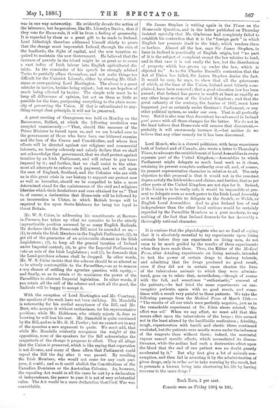With the exception of Lord Hartington and Mr. Courtney, the
speakers of the week have not been striking. Mr. Mundella is noteworthy for his cordial acceptance of the Bill, and Mr. Burt, who accepts it without enthusiasm, for his representative position; while Mr. Hobhouse, who utterly rejects it, does so knowing he will lose his seat. Mr. Stansfeld is quite convinced by the Bill, and so is Mr. H. H. Fowler ; but we cannot see in any of the speeches a new argument to quote. We must add, that while Mr. Mundella evidently recognises the weight of the opposition, none of the speakers for the Bill acknowledge the magnitude of the change it proposes to effect. They all allege that the Union is preserved, which is like saying that separation is not divorce, and many of them affirm that Parliament could repeal the Bill the day after it was passed. By recalling the Irish Members, who would not come for any such pur- pose, it could ; and so it could abolish the Constitutions of the Canadian Dominion or the Australian Colonies. As, however, the repealing Act would in all the cases be met by a declaration of independence, the power to pass it is not of very substantial value. The Act would be a mere declaration that Civil War was unavoidable.




































 Previous page
Previous page